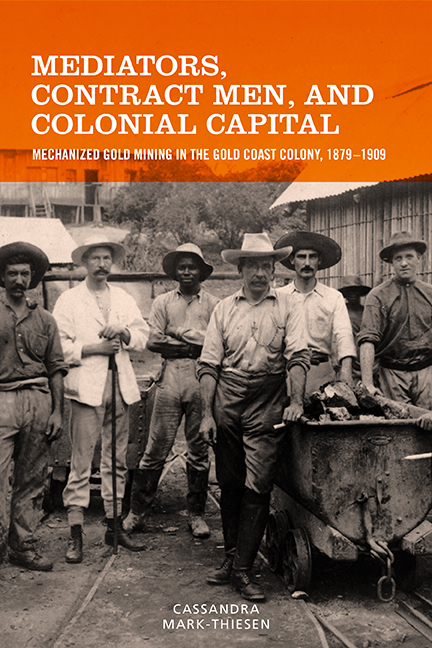 Mediators, Contract Men, and Colonial Capital
Mediators, Contract Men, and Colonial Capital Book contents
- Frontmatter
- Dedication
- Contents
- List of Illustrations
- Acknowledgments
- Introduction
- 1 Prospectors, Politicians, and the Question of “Progress”: The First and Second Gold Booms in Wassa
- 2 Labor Recruitment in the Nineteenth Century: The Place of Practicality
- 3 Disrupted Recruitment at the Turn of the Twentieth Century: Women, Whites, and Other Labor Agents
- 4 Government Strategies for Assisting the Mines
- 5 Labor Agents, Chiefs and Officials, 1905–1909: The Incorporation of the Northern Territories’ Labor Reserve
- Conclusion
- Notes
- Bibliography
- Index
- Frontmatter
- Dedication
- Contents
- List of Illustrations
- Acknowledgments
- Introduction
- 1 Prospectors, Politicians, and the Question of “Progress”: The First and Second Gold Booms in Wassa
- 2 Labor Recruitment in the Nineteenth Century: The Place of Practicality
- 3 Disrupted Recruitment at the Turn of the Twentieth Century: Women, Whites, and Other Labor Agents
- 4 Government Strategies for Assisting the Mines
- 5 Labor Agents, Chiefs and Officials, 1905–1909: The Incorporation of the Northern Territories’ Labor Reserve
- Conclusion
- Notes
- Bibliography
- Index
Summary
By 1910 the port of Sekondi in the western protectorate of the Gold Coast had already been serving as an entrepôt between Wassa and the expansive Atlantic world for several centuries. Dutch officials initially took an interest in the location because it possessed a good landing beach that was fairly well sheltered from strong winds and because of its close proximity to Wassa, which was known to be a rich source of gold. Although initially only land and water trade routes led to the gold-producing interior region, under the British colonial administration a government railway was constructed, reaching Tarkwa in 1901, Obuase in 1902, Kumase in 1903, and Prestea in 1911. Unlike the cocoa and palm oil trade that determined the success of colonial ports in the eastern protectorate, to the west, the gold trade stood above all else, putting Sekondi in a dominant position as neighboring ports fell into a state of decay. It was a place of comings and goings, not just in trade (other primary exports included timber and rubber) but also in people. When the mechanized gold mines were established in the 1870s, miners from Britain, Australia, and the United States landed there in large numbers by way of a surfboat on their way to Wassa, as did most Liberian contract workers, for whom it was safer to travel along the coast by sea. By the turn of the century, Sekondi began to attract a growing number of migrant workers traveling on foot as well. Although some undertook the risk of a solo voyage, most of them arrived in Sekondi as part of a small gang led by an African labor agent. Sekondi was where agents serving the gold mines usually came to engage new recruits for contract work on the concessions or other types of wage work.
But if a port is the greatest signifier of a region's integration into the world economy, then the story that Sekondi told was one of haphazard incorporation. Although British officials had clearly invested time and money in the port city, its potential had simultaneously been tempered by mediocre expectations and missed opportunities. After a brief stay here during her travels through West Africa, the novelist Mary Gaunt described “a pretty place” straggling “up and down many hills.”
- Type
- Chapter
- Information
- Mediators, Contract Men, and Colonial CapitalMechanized Gold Mining in the Gold Coast Colony, 1879–1909, pp. 1 - 15Publisher: Boydell & BrewerPrint publication year: 2018


